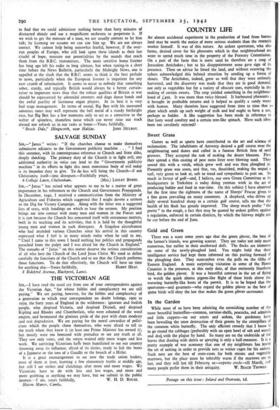COUNTRY LIFE
AN almost accidental experiment in the production of food from barren land may be worth the notice of more serious students than the research
Worker himself. It was of this nature. An ardent sportsman, who also farms, desired cover for his pheasants which in that neighbourhood are wont to spend much time in the property of the Forestry Commission. On a part of the farm that is mere sand he therefore set a crop of Jerusalem Artichokes ; but to his disappointment none gave sign of its presence. Then on advice he limed the land, and without resowing the tubers acknowledged this belated attention by sending up a forest of shoots. The Artichokes, indeed, grew so well that they were seriously harvested, and the discovery was made that they are in good demand, not only as vegetables but for a variety of obscure uses, especially in the making of certain sweets. The crop yielded something in the neighbour- hood of £400. It was more than twice blessed. It harboured pheasants ; it brought in profitable returns and it helped to qualify a sandy waste with humus. Many theorists have suggested from time to time that a- plant which sends up such weight of stalk and leaf ought to have a use, perhaps as fodder. A like suggestion has been made in reference to that lusty weed comfrey and a certain tree-like spinach. Have such ideas been too cavalierly rejected?
Sweet Grass
Games as well as sports have contributed to the art and science of reclamation. The inhabitants of Antwerp desired a golf course over the neighbouring sand dunes and called in a famous British firm of, seed growers. They accepted the task of making the desert blossom. First they spread a thin coating of peat moss litter over blowing sand. They sowed this with a vetch, which grew well and was then ploughed in. Presently grass was sown, and that, too, flourished, making the sequel a turf, very green to look at, soft to tread and sympathetic to putt on. So much in favour of golf—and, I believe, our own Green Committee at its headquarters in Yorkshire is today doing yeoman work in the art of producing fodder and food in war-time. On this subject I have observed for the first time the rightness of the name of Sheeps' Fescue given to a fine grass prevailing on many commons. A shepherd, who drives up daily several hundred sheep to a certain golf course, tells me that the health of his flock has greatly improved. The sheep much prefer " the pretty " to the rough, a fact that may be quoted by ardent golfers against a regulation, enforced in certain districts, by which the fairway might not be cut before the end of June.
Gold and Green
There was a scare some years ago that the green plover, the best of the farmer's friends, was growing scarcer. They are today not only more numerous, but earlier in their southward drift. The flocks are immense on some of the newly-ploughed land. You might hold that their intelligence service had kept them informed on this putting forward of the ploughing date. They outnumber even thp gulls on the tilths of Eastern England. A more surprising visitation in some of the Home Counties is the presence, at this early date, of that eminently Northern bird, the golden plover. It was a beautiful contrast in the art of flying to watch the quick almost pigeon-like flight of these birds above the wavering butterfly-like hosts of the peewit. It is to be hoped that the sportsmen—and gourmets—who regard the golden plover as the best of game birds will obey the law that makes the green plover sacrosanct.
In the Garden While most of us have been admiring the astonishing number of the more beautiful butterflies--commas, tortoise-shells, peacocks, red admirals and little coppers—on our asters and sedum, the gardeners have been bewailing the utter destruction of their greens by the caterpillars of the common white butterfly. The only efficient remedy that I know is to go round the cabbages (preferably with an open bowl of salt and water) and deal, with the plague by hand. So many are on the underside of the leaves that dusting with derris or spraying is only a half-measure. It is a pretty example of war economy that one of my neighbours has learnt the art of netting in order to provide nets as winter cages for his onions. Such nets are the best of store-cases for both onions and vegetable marrows, but the place must be tolerably warm if the marrows are to last, and they will last till February or—experto crede—till March, and many people prefer them in their antiquity. W. BEACH THOMAS.
Postage on this issue : Inland and Overseas, id.


























 Previous page
Previous page